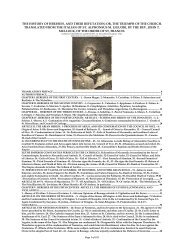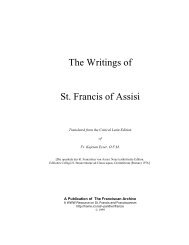Saint Anthony Mary Claret - Catholic Apologetics Information
Saint Anthony Mary Claret - Catholic Apologetics Information
Saint Anthony Mary Claret - Catholic Apologetics Information
Create successful ePaper yourself
Turn your PDF publications into a flip-book with our unique Google optimized e-Paper software.
28. My parents and teacher not only instructed me in the truths I had to believe but also in the<br />
virtues I needed to practice. With regard to my neighbor, they told me never to take or covet what<br />
belongs to others and that, if I ever found something, I should return it to its owner. It just so happened<br />
that one day after school, as I was walking along the street toward home, I saw a quarter 23 lying on the<br />
ground. I picked it up and wondered to whom I should return it. Since I couldn't see anyone on the street,<br />
I decided that it must have fallen from the window of the nearest house. So I went up to the house, asked<br />
for the head of the house, and gave him the quarter.<br />
29. I was trained so well in obedience and resignation that I was always content with whatever<br />
was done, decided, or given to me by way of food or clothing. I never remember saying "I don't like<br />
this" or "I want that." I was so used to thinking like this that even later, when I was a priest, my mother,<br />
who was always very fond of me, used to say, "<strong>Anthony</strong>, would you like this?" I would always answer,<br />
"I always like what you like." "But," she would say, "there are always some things we like better than<br />
others." And then I'd say, "Whatever you give me is what I like best of all." And so she died without<br />
finding out what material things I liked the best 24 .<br />
Chapter V<br />
AT WORK IN THE FACTORY<br />
30. When I was still a small boy in elementary school, a distinguished visitor to the school asked<br />
me what I wanted to be when I grew up. I answered that I wanted to be a priest 25 . Accordingly, when I<br />
had successfully completed my elementary school, I was enrolled in the Latin class taught by a very holy<br />
and learned priest, Dr. John Riera. From him I learned and memorized nouns, verbs, genders, and a bit<br />
more, but as the class was discontinued I could no longer study and had to give it up 26 .<br />
31. Since my father manufactured thread and cloth, he set me to work in his factory 27 . I obeyed<br />
without a word, a long face, or any sign of displeasure. I set to work as hard as I could and never spent<br />
an idle, half-hearted day. I did everything to the best of my ability so as not to displease my dear parents<br />
in the slightest, because I loved them very much and they loved me.<br />
32. What used to hurt me the most was to hear that my parents would have to scold a worker for<br />
not doing his job properly. I am sure that I suffered more than the one who was being corrected because<br />
I am so tender-hearted that when I see someone hurt I feel it more than he does.<br />
33. My father set me to work on every job available in his well-equipped little thread and textile<br />
factory. For a long time I and another young man were in charge of putting the finishing touches on the<br />
work of everyone else in the shop. Whenever we had to correct anyone, it upset me a great deal; yet I did<br />
my duty. I always tried to find something good to say about the piece of finished work. I would praise its<br />
good points, saying that this or that about it was very good but that it had such and such a defect and if<br />
these little defects were corrected, it would really be a perfect job.<br />
34. I didn't know why I did things this way, but in time I came to see that it was the result of a<br />
special grace of kindness that the Lord had granted me. This is why the workers always took correction<br />
from me and mended their ways. My friend, however, who was a better worker than I but lacked this gift<br />
of kindness, always got upset when he had to correct anybody. He would scold the workers harshly and<br />
they would get angry, and often they wouldn't know what it was they were supposed to correct. I learned<br />
from this that everyone, even the rudest people, should be treated kindly and affably and that much more<br />
may be gained by kindness than by harshness and irritability.<br />
23 A quarter was worth three centimos.<br />
24 The <strong>Saint</strong>'s mother died in 1842, when he was 35 years old.<br />
25 The distinguished visitor was probably the Archbishop of Palmyra and Abbe of la Granja, Bishop Felix Amat, who had retired in<br />
Sallent, together with his sister, the mother of His Excellency, Torres Amat. Bishop Felix conferred the sacrament of Confirmation on<br />
<strong>Anthony</strong> on December 12,1814.<br />
26 <strong>Anthony</strong> attended only one course, and perhaps not a complete one, because his teacher died and the Latin school closed in<br />
1819. (Cf. Sola, History of Sallent, pp. 323-32).<br />
27 His first job in the little family factory was tending the spinning jenny, loading the bobbins that had to be fed into the shuttles of<br />
the looms. (Apostolic Process, Vich, session 69.)<br />
12













